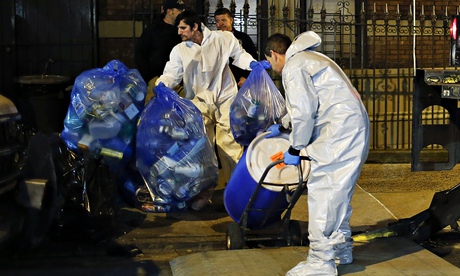
Quarantine measures imposed on travellers to the US from Ebola-affected countries in west Africa who have had contact with the disease could discourage American health workers from going there to help fight the epidemic, a senior medical official has warned .
“I don’t want to be directly criticising the decision that was made, but we have to be careful that there are unintended consequences,” Anthony Fauci, the director of the National Institute of Allergy and Infectious Diseases, said of the measures imposed by four US states: New York, New Jersey, Illinois and Florida.
“The best way to stop this epidemic is to help the people in west Africa, we do that by sending people over there, not only from the USA, but from other places,” Fauci told US broadcaster NBC’s Meet the Press, adding that such quarantines were “a little bit draconian”.
His comments came as Australia isolated an 18-year-old girl who arrived in Brisbane from Guinea after she showed signs of fever. The girl was taken to the Royal Brisbane and Women’s hospital.
She arrived in Australia 11 days ago with eight members of her extended family, all of whom were placed under home quarantine. Test results on the girl were expected in the early hours of Monday.
Meanwhile, Samantha Power, the US ambassador to the United Nations, arrived in Guinea’s capital, Conakry, on Sunday, and plans also to visit Liberia and Sierra Leone to see the global response to the Ebola epidemic first hand.
Florida joined three other US states on Sunday in imposing a 21-day mandatory quarantine period for anyone arriving with a risk of having contracted Ebola in Sierra Leone, Liberia and Guinea. They are the three west African countries that have borne the brunt of an epidemic that has killed nearly 5,000 people.
The policies were abruptly imposed after a New York City doctor was diagnosed with the disease on Thursday after coming home from treating patients in Guinea.
A nurse who returned on Friday through New Jersey’s Newark airport, after working in Sierra Leone with Ebola patients, strongly criticised the quarantine policy on Saturday, describing hours of questioning and then transfer to a hospital isolation tent, calling her treatment a “frenzy of disorganisation”.
Fauci reiterated that the disease is spread only by contact with body fluids of people with symptoms. There have been four cases of the disease diagnosed in the US.
“The science tells us that people who are not sick, if you do not come into contact with body fluid, if someone comes back from wherever, Liberia, and they’re well, they are no danger to anyone,” Fauci said.
But New Jersey’s governor, Chris Christie, asked to respond to Fauci’s comment that it is not good science to quarantine people when they are not symptomatic, said: “I don’t believe that when you’re dealing with something as serious as this that we can count on a voluntary system.”
“This is government’s job. If anything else, the government’s job is to protect the safety and health of our citizens,” he told the Fox News Sunday programme.
Asked whether the new rules would discourage health workers from going to west Africa, Christie added: “Folks that are willing to take that step and willing to volunteer also understand that it’s in their interest and in the public health’s interest to have a 21-day period thereafter if they’ve been directly exposed to people with the virus.”
Ebola has killed almost half of more than 10,000 people diagnosed with the disease – predominantly in Liberia, Sierra Leone and Guinea – although the true toll is far higher, according to the World Health Organisation.
